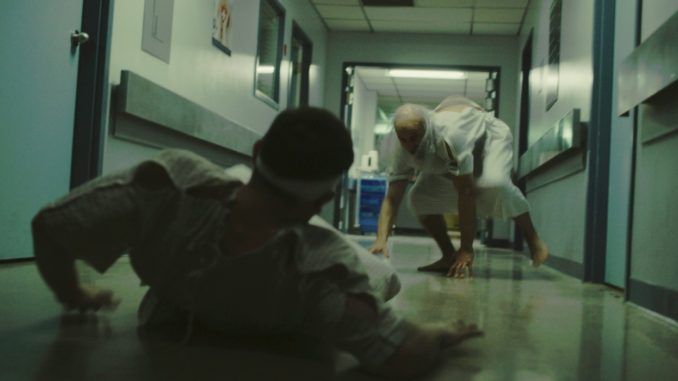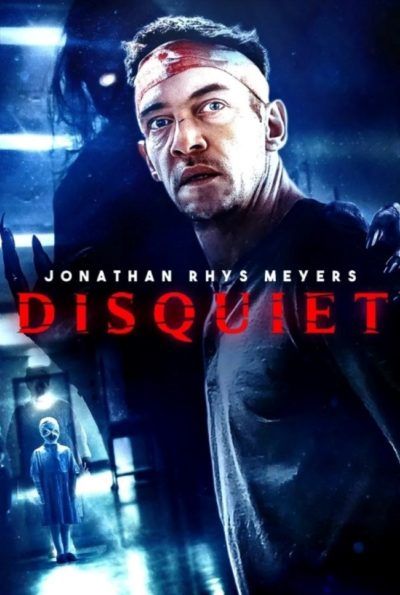
Rating: B
Dir: Michael Winnick
Star: Jonathan Rhys Meyers, Garry Chalk, Rachelle Goulding, Elyse Levesque
This was a good movie.
What, you want more? Well, there might be a bit of a problem. Because this feels like the kind of film it would be easy to spoil, and it deserves better than that. Even saying it reminded me strongly of [REDACTED] would potentially be a major clue. I don’t think Winnick is going all-in for an M. Night Shyamalan approach, where the twist is the film. I figured out quite quickly the hero is [REDACTED]. This didn’t impact my enjoyment significantly: it just became a different pleasure, seeing how the pieces fitted my conclusion. Indeed, I told Chris, “[REDACTED], isn’t he?” five minutes in. I was half-joking, and yet… here we are.
The fact the paragraph above resembles a CIA document on the assassination of President Kennedy, gives you an idea of how tricky this is to write about. I can probably discuss the first five minutes safely enough. Sam (Meyers) is involved in a hellacious car accident and is carted off to hospital. Regaining consciousness, he quickly determines something is off. The facility is almost deserted, he’s attacked by another patient (top), and then [REDACTED REDACTED REDACTED DAMMIT REDACTED]. He does eventually meet other people who seem to be in a similar situation, such as a racist cop, along with Dr. Lily (Goulding), and affable senior citizen Virgil (Chalk), who have sharply differing ideas on the best direction Sam should take, to get out and be reunited with his pregnant wife.
 I fear I may already have said too much, though again: it feels like the movie shrugs its shoulders and gets on with its business, if you figure out the direction first. Once you accept the (admittedly extreme) central premise, what happens subsequently does appear to possess an internal logic. The characters Sam meets act consistently, and the “rules” by which the hospital operates seem evenly applied – not always the case when the genres of thriller and horror merge, in the way they do here. Some entries use the presence of supernatural elements as an excuse to hand-wave away internal logic. This is more rigorous, and better for it.
I fear I may already have said too much, though again: it feels like the movie shrugs its shoulders and gets on with its business, if you figure out the direction first. Once you accept the (admittedly extreme) central premise, what happens subsequently does appear to possess an internal logic. The characters Sam meets act consistently, and the “rules” by which the hospital operates seem evenly applied – not always the case when the genres of thriller and horror merge, in the way they do here. Some entries use the presence of supernatural elements as an excuse to hand-wave away internal logic. This is more rigorous, and better for it.
Certainly, the presence of Meyers is an effective one, essential in keeping the film grounded. I knew him previously as warrior priest Bishop Heahmund in Vikings, so seeing him as a loving husband took some getting used to. However, his reactions to the bizarre circumstances here felt natural, and it’s a performance which is a significant factor in the movie’s success. Despite spotting the overall direction, things didn’t end entirely as anticipated, although the finale could perhaps have done with more room to breathe. We go from a final reveal to the end credits in a few seconds, and I’d have welcomed a pause to gather my thoughts, rather than feeling as if I was being rushed to the exit.
It’s a rare misstep, and is in line with the way the film starts, wasting little time before things get both weird and interesting. This is a tone Winnick is largely successful in maintaining. He does a good job of moving things forward, while providing the occasional jump-scare, without it seeming too much like a cheap shock. I’m curious as to how it’d stand up to a repeat viewing, now being aware of where it’s heading. I suspect, better than most of its kind, although not knowing [REDACTED], is likely a help.
Disquiet is out today in select theatres, on digital, and on demand.
